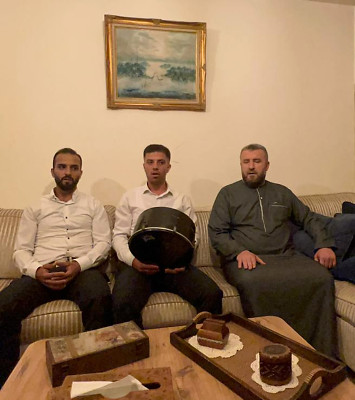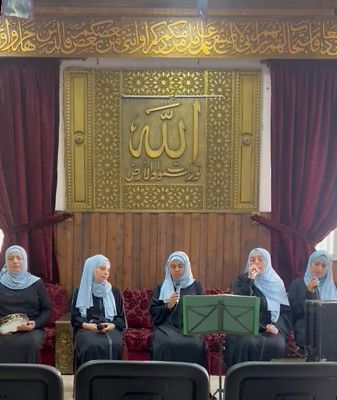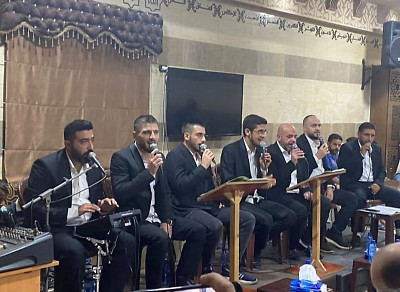Mawlid, spiritual religious song or praise of the Prophet
 The Mawlid is based on ancient or modern traditional religious poems which speak of exhorting obedience, doing good, loving God, drawing closer to Him, purifying the soul and loving the Messenger of God (God bless him and give him peace) and his attributes, deeds and characteristics, as well as all other religious matters, including religious figures and religious works.
The Mawlid is based on ancient or modern traditional religious poems which speak of exhorting obedience, doing good, loving God, drawing closer to Him, purifying the soul and loving the Messenger of God (God bless him and give him peace) and his attributes, deeds and characteristics, as well as all other religious matters, including religious figures and religious works.
 Singing inchâd and praise requires elements to perform the work, including singers, choirs, and percussionists, all of whom undergo professional training in accordance with the saying of the Prophet, may God bless him and grant him peace (God loves that when one does a job, he masters it). The traditional musical instrument of Mawlid is the drum. It is, currently being replaced by a manually controlled electronic instrument combining several types of sounds (drums, tambourines, flutes, silencers and cymbals).
Singing inchâd and praise requires elements to perform the work, including singers, choirs, and percussionists, all of whom undergo professional training in accordance with the saying of the Prophet, may God bless him and grant him peace (God loves that when one does a job, he masters it). The traditional musical instrument of Mawlid is the drum. It is, currently being replaced by a manually controlled electronic instrument combining several types of sounds (drums, tambourines, flutes, silencers and cymbals).
 Regarding the singers’ costume, it is important that the group adopts a uniform dress code. This is one of the important conditions for the appearance of singers in public. This dress code differs depending on where the concert takes place.
Regarding the singers’ costume, it is important that the group adopts a uniform dress code. This is one of the important conditions for the appearance of singers in public. This dress code differs depending on where the concert takes place.
Inchâd was traditionally passed down through generations of singers Munchidin by memorization of lyrics and melody. Today, women learn religious songs inchâd to animate the mawled with women’s groups and transmission happens frequently through recordings, means of communication and media.
Among the most important occasions that are sung and praised are the birthday of the Prophet, the migration of the Prophet, Isra and Mir’aj and Ramadan and other Muslim festivals. The Mawlid also celebrates life events such as births, marriages and condolences to pray for the soul of the deceased. It is held for other actions and events in which a birth ceremony is held for the purpose of facilitating and blessing. There is no specific specialized location for the Mawlid, the ceremony takes place in a mosque, a corner, a hospice, a theater, a hall, a house, a courtyard or even in the street. Each location requires a specific style of singing.
Religious chanting is indispensable among the Islamic community, in general, because it conveys the message of moderate, tolerant Islam and its doctrine in an easy, simple manner that most people like. It is threatened by the presence of extremist Muslim groups spreading the idea that religious singing is heresy and, therefore, should be banned. Also, the emergence of inexperienced singers tarnishes its reputation, especially among listeners who are familiar with its music and melody.

